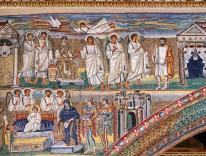
Liberal political philosophy has been under fire from the start. One of the essential facts about this centuries-old tradition is its resilience—fellow travelers will call it adaptability; anti-liberals might characterize it as slipperiness—in the face of attacks from both right and left. Two related critiques are commonly lodged at liberalism by thinkers aligned with emancipatory political projects: that the tradition, with its defense of private-property rights, authorizes economic inequality; and that it hollows out political life by theorizing the state as little more than the protector of individual rights. According to this latter critique, man no longer resembles the “political animal” described by the ancients but rather an isolated creature pursuing his private interests in civil society.
In his influential 1971 book, A Theory of Justice, John Rawls attempts to redirect liberalism’s attention to the demands of social and economic equality. His famous difference principle—that inequalities in wealth or social status are justifiable only if they are to the benefit of the worst off—would, if realized, be almost revolutionary in its leveling of existing disparities between the rich and poor. But in the first part of her new book, Justice by Means of Democracy, the political theorist Danielle Allen argues that Rawls sacrifices political equality and the intrinsic value of political participation at the altar of economic redistribution. In the rest of the book, Allen develops a theory of justice that recovers the principle of political equality and the intrinsic value of political participation for liberal political philosophy.
Rawlsian liberalism, in Allen’s reading, prizes freedoms of individual autonomy and conscience—sometimes dubbed the “negative liberties”—over the positive liberties that guarantee meaningful influence over political decisions. Why does this become a problem? Because human beings are creatures who have purposes, who make judgments about how to pursue their own flourishing. This purposiveness, this capacity for judgement, is the basis of human moral equality. But our social context supplies many of the ingredients that we use to craft our purposes. What’s more, our social context constrains us in our pursuit of autonomy: every society enables certain courses of life and disables others. Political empowerment—the capacity to influence the rules that constrain a collective—is thus an essential component of human autonomy. If our equality is to be reflected in the political sphere, our polities must be democratic. Democracy is not just one regime type among many; it is a non-negotiable requirement of human equality.
Unlike many other versions of liberalism, Allen’s “power-sharing liberalism” sees justice as the ground of human flourishing. Armed with three principles of justice—political equality; the non-sacrificability of both negative and positive liberty; and “difference without domination,” a principle that prohibits any social distinctions from leaving some at the mercy of others—Allen devotes most of the book to teasing out the demands of human flourishing across the political, economic, and social spheres. She presents us with several subsidiary ideals across various domains of human life: a constitutional democracy that is egalitarian and participatory; a social sphere that prizes human connection and solidarity; and an economy that empowers everyone to satisfy their obligations as citizens.
While Allen makes good use of the idiom of the Rawlsian tradition, her own project—its methods, its intellectual sources—turns out to be starkly different than that of Rawls. In A Theory of Justice, Rawls offers a social-contract theory of an especially abstract sort. Unlike canonical contract theorists such as Locke, Hobbes, and Rousseau, who all develop particular conceptions of human nature that serve to legitimate political authority, Rawls's principles of justice flow from a purely hypothetical situation in which theoretical citizens are abstracted from most recognizable human attributes (religion, gender, values, culture). Allen’s text features no such hypothetical exercise. Leaving behind Rawls’s austere Kantianism, she develops a liberal theory of justice guided by Aristotle’s account of the good life, W.E.B DuBois’s critique of social domination, and John Dewey’s vision of democratic inquiry. Her analysis begins from our concrete situation: empirically observable patterns of political, economic, and social behavior. For Allen, the role of the political philosopher is to unearth the principles and beliefs that lie at the root of our practices, and to present revised principles that might better facilitate human flourishing. Thus, a theory of justice is not just about big institutions like states or property regimes; it’s also a matter of the cultural norms that inform how we talk to our neighbors.
While no less ambitious than Rawls’s masterwork, Justice By Means of Democracy is less than half as long. In a book that represents the culmination of all her academic work thus far, Allen exhibits almost superhuman self-discipline. She heroically resists every opportunity to digress, over-qualify, or repeat herself. This brevity is of philosophical import. Time and again, Allen brings up some knotty dilemma that could occasion thousands of words of hand-wringing, provides the reader with some perceptive normative resources she can carry into political life, and then, after a few pages, moves right along. Allen seems to believe that philosophy is limited in its capacity to offer a priori solutions to the tragedies and paradoxes political actors face. As a democrat who is also a philosopher, she hopes merely to equip her readers with some guiding considerations and principles as they engage in real-world practices of deliberation and experimentation. In the final analysis, Allen’s theory of justice is not so much a rigid blueprint for an ideal polity as a toolkit for democratic life.
There are moments in Justice by Means of Democracy where one is left disappointed by the particular tools Allen offers—especially in her account of the relationship between economic life and the requirements of political equality. At one point, she expresses interest in proposals that would “democratize the firm.” This phrase conjures images of workers making decisions about production through richly democratic practices of inquiry, deliberation, delegation, and the like. As it turns out, however, a radical form of economic democracy is not where Allen’s real sympathies ultimately lie. Instead, she endorses a form of “stakeholder capitalism,” where final decisions about production remain, to a significant extent, the purview of owners, who are implored to act according to purposes beyond profit-seeking, while states and unions are empowered to check the power of capital. What she calls “democracy-supporting firms” are those that provide their workers with the stability, material resources, and time to satisfy their obligations as citizens. Allen’s aim is to “restore economic questions to a secondary place within the structure of human aspiration.” A secondary demand of justice in the economic sphere is to minimize domination, but the primary demand is to permit individuals to step off the job and into the public square.
Allen’s economic vision is vulnerable to all the standard left-wing arguments. (The wage relation itself creates a structural antagonism that cannot be separated from domination; capitalist production is organized by a form of value that cannot be overcome merely by having firms adopt some beneficent “purpose”). Here, though, I want to offer an adjacent critique, one that relates to a central democratic dilemma in an era characterized by faltering faith in the idea of self-rule: Where and how are we going to develop the capacities that could enable us to genuinely govern ourselves amid the complexity of modern life? Are human beings really up to the democratic ideal?
Several times in the book, Allen references W.E.B. DuBois’s famous argument that the political enfranchisement of African Americans is necessary to avoid a second slavery. Political empowerment, for DuBois and Allen, is a necessary component of the experience of freedom. I wholeheartedly agree. But political empowerment is more than an institutional fact: it is also a capacity. One must learn how to become a power, how to become a co-creator of the collective life of one’s community. In her model of the practice of democratic citizenship, Allen emphasizes the importance of civic education, as well as major economic reforms that would grant individuals the free time to practice the activities of civic life. But this raises a chicken-and-egg question: Where could we develop the civic capacities necessary to transform our political and economic structures so that we have the time we need to develop our civic capacities?
DuBois offers some insight here. He locates resources for political learning in the situation where many of us find ourselves for most of our waking hours: at work. In his remarkable 1920 text Darkwater, DuBois points out that democracy has not touched the matters “nearest” to the majority of people: namely, matters of “work and wages.” He thought this explained our civic apathy. Struggles for democracy in the workplace make use of the existing expertise of workers (how to make things, deliver services with care, and operate complex systems of production) and foster nascent capacities of democratic citizenship (deliberating over the proper course of action on a basis of equality). “Unless men rule industry,” DuBois asks, “can they ever hope really to make laws or educate children or create beauty?” The democratization of production is revealed, in DuBois's account, to be a seedbed of civic virtue.
Democracy is the form of government that demands of its subjects the greatest intellectual and ethical agility. For that reason, education has long been important to democrats. But education does not occur only in schools: we also receive an education when we engage in practical projects with our neighbors, colleagues, and countrymen. Allen rightly insists that democratic practices—voting, speaking before a city council, protesting—are themselves a school in autonomy. But many of our practical projects take place at work, and they too can impart a civic education. After all, the struggle for autonomy in the face of constraint is one of the great themes of contemporary economic life. When an employee enlists the help of a colleague to oppose an unfair scheduling policy, she receives an education in solidarity, collaboration, and problem solving; when she faces resistance, she receives an education in the nature of the social order, one that she might carry with her to the ballot box or into the street.
Allen has done political philosophy a great service with this book, despite its limits. Liberals and non-liberals alike should applaud its arrival. She powerfully condemns as incoherent philosophies that claim to honor liberty but sacrifice democracy. She recognizes, like Aristotle before her, that justice must be achieved both in the law and in our interpersonal relationships. A robust democratic ethos, she rightly argues, must accompany any successful project of democratic renewal. Beyond the institutional transformation that justice requires must come, as DuBois would put it, “the Spirit—the Will to Human Brotherhood of all Colors, Races, and Creeds; the Wanting of the Wants of All.”
Justice by Means of Democracy
Danielle Allen
University of Chicago Press, $27.50, 288 pp.

